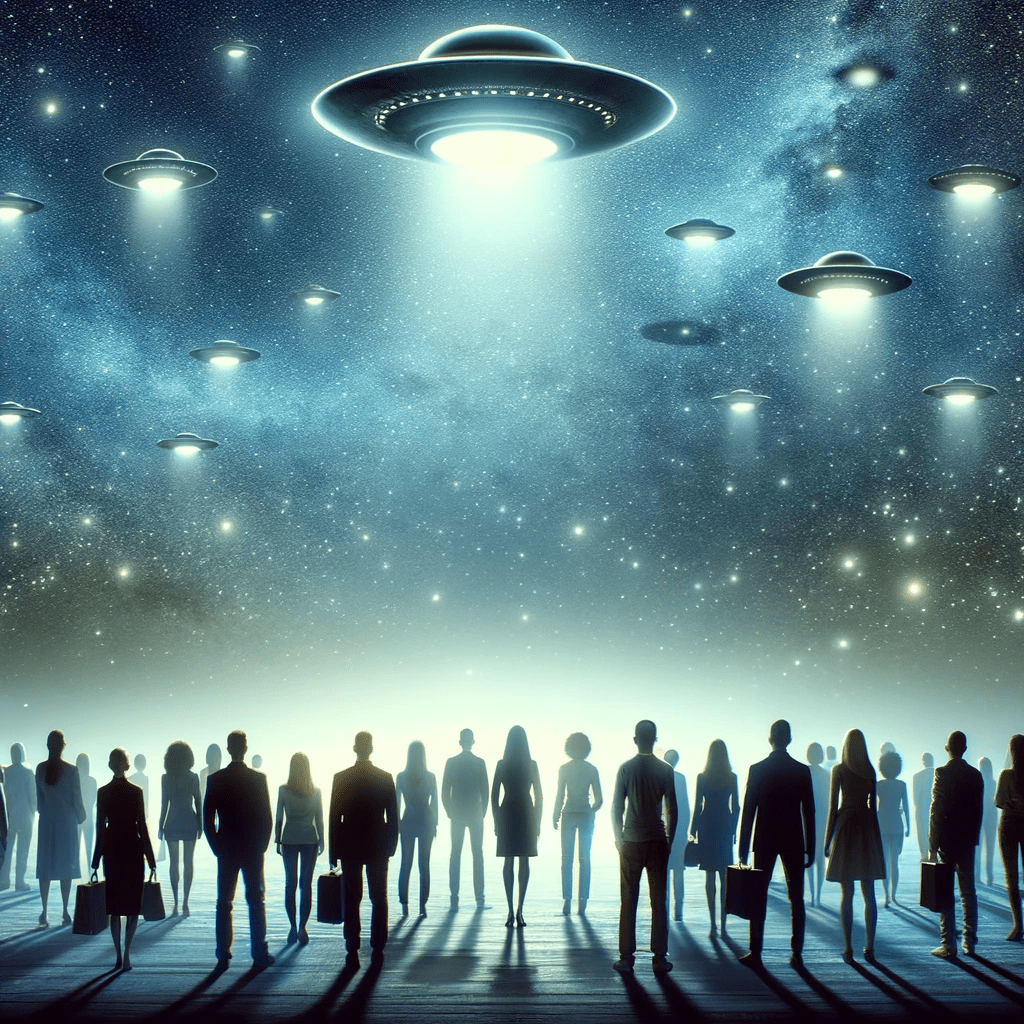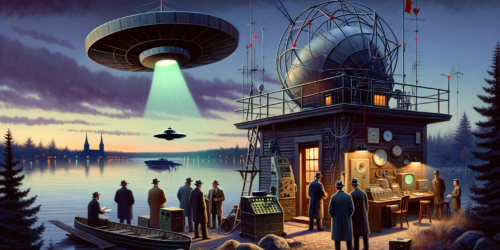Can The Public Handle The Truth?

In Episode #46 of “Weaponized,” titled “The History Of UFO Disclosure – Can The Public Handle The Truth?”, Richard Dolan, interviewed by Jeremy Corbell and George Knapp, provides a comprehensive discussion on the phenomenon of UFOs (Unidentified Flying Objects). Dolan, a well-known historian and author in the UFO community, looks into various aspects of UFO sightings, government interactions, and the potential implications of disclosure.
Throughout the interview, Dolan emphasizes the global prevalence of the UFO phenomenon, underscoring its persistent presence across the Earth. He argues that despite the frequency of sightings and interactions, especially by military forces worldwide, there remains a significant gap in public understanding and government acknowledgment of these occurrences.
One key point Dolan addresses is the long-term surveillance of Earth by UFOs. He points out that this surveillance includes incidents where UFOs have disabled nuclear weapons in various countries, including the United States and Russia. This aspect highlights the advanced capabilities of these unidentified objects and raises questions about their intentions and the potential threat they pose.
Dolan also touches upon the historical context of UFO sightings, dating back to the 1940s. He presents a case for a consistent pattern of UFO interactions with military forces, suggesting a well-documented history of such events. This history, according to Dolan, indicates a more profound knowledge within certain sections of the government and military, which contrasts with the public narrative of uncertainty around UFOs.
In the “Weaponized” episode featuring Richard Dolan, he explores the intriguing possibility of major aerospace and defense companies being involved in the study and reverse-engineering of UFO technology. Dolan specifically mentions Lockheed Martin, Boeing, Raytheon, and Northrop Grumman, all renowned for their advanced research and development in defense and aerospace technologies. These companies, with their extensive expertise, resources, and established relationships with the U.S. military and government, are posited as likely candidates for classified projects related to extraterrestrial technologies.
Dolan emphasizes the significant role of the private sector in UFO research, particularly pointing to these large defense contractors as having potentially better resources and capabilities than some government entities for conducting advanced research into UFO phenomena. He looks into the theme of the privatization of UFO secrets, suggesting that sensitive information and technology related to UFOs might be managed within these private corporations. This arrangement could add a layer of secrecy, distancing the information from public and governmental oversight.
Discussing the potential areas of research, Dolan speculates on the advanced work possibly being conducted in anti-gravity, propulsion technology, and material sciences. This research, he hypothesizes, could be influenced by technologies observed or recovered from UFO encounters, suggesting a significant leap in technological advancement spurred by these unearthly influences.
In the episode, Richard Dolan looks into the reasons why various countries have refrained from pursuing independent UFO disclosure, shedding light on the complexities of global geopolitics and the significant influence of the United States in this domain. Dolan underscores the pivotal role of the U.S. in managing UFO secrecy, positioning it as the primary repository of sensitive information gleaned from extensive UFO research and encounters. This leadership gives the U.S. considerable sway over the timing and manner of UFO information disclosure.
While acknowledging the dominant U.S. role, Dolan also recognizes the potential of countries like Russia and China, which may have their own UFO research programs, less swayed by U.S. policies. These nations could act unpredictably in the global UFO disclosure narrative, though their exact motivations and knowledge levels are a matter of speculation.
Dolan addresses the risks tied to a country independently revealing UFO information, emphasizing the possible upheaval it could cause in global diplomatic relations and the exposure of sensitive technological or military data. Such a move could challenge the narrative predominantly controlled by the U.S. and its allies, possibly leading to unpredictable consequences in international dynamics. He also notes the absence of a global consensus on handling the UFO phenomenon, with countries displaying varied levels of awareness, interest, and capabilities in this area. He posits that these elements collectively dissuade countries from pursuing their own paths toward UFO disclosure, maintaining a status quo of secrecy and ambiguity on a global scale.
In the episode, Richard Dolan discusses the topic of UFO disclosure, specifically focusing on the significance of David Grusch’s testimony to Congress and the mainstream media’s reluctance to extensively cover the UFO phenomenon.
- David Grusch’s Testimony to Congress: Dolan examines the impact of David Grusch’s testimony before Congress, highlighting its potential explosiveness in the context of UFO disclosure. Grusch’s statements, which included remarkable revelations about UFOs and possibly extraterrestrial technology, were seen as a significant moment that could have propelled the disclosure movement forward. However, Dolan notes that despite the gravity of Grusch’s testimony, it did not lead to the kind of widespread acknowledgment or action that might have been expected. He points out that Grusch’s testimony, while groundbreaking, was constrained by security clearances and the sensitive nature of the information, which limited how much could be publicly disclosed.
- Government’s Reluctance to Fully Disclose: Dolan expresses skepticism about the likelihood of the U.S. government fully disclosing what it knows about UFOs. He suggests that the government has never engaged in an open and honest dialogue about UFOs, maintaining a culture of secrecy and denial. This stance, according to Dolan, stems from concerns over national security, technological secrecy, and the potential repercussions of admitting to a long history of misinformation on the subject. Dolan implies that the government is likely to continue controlling the narrative and releasing information in a very measured and calculated manner, rather than embracing full transparency.
- Mainstream Media’s Limited Coverage: Dolan also addresses the role of mainstream media in the UFO disclosure process. He observes that while there has been some coverage of the UFO topic, particularly following key events like Grusch’s testimony or the release of military videos showing unidentified aerial phenomena, the mainstream media has generally been hesitant to give the subject extensive coverage. Dolan argues that this reticence is partly due to the media’s longstanding alignment with government narratives and a reluctance to look into topics that might be seen as fringe or controversial. He suggests that mainstream media outlets often include skeptical or dismissive perspectives in their coverage, which dilutes the impact of the information being presented.
Richard Dolan’s discussion on the topic of UFO disclosure paints a picture of a complex interplay between government secrecy, limited congressional action despite significant testimonies like that of David Grusch, and a mainstream media landscape that is cautious about fully embracing the UFO phenomenon. He implies that these factors collectively hinder the progress of full disclosure, maintaining a status quo where definitive answers and transparency remain elusive.



